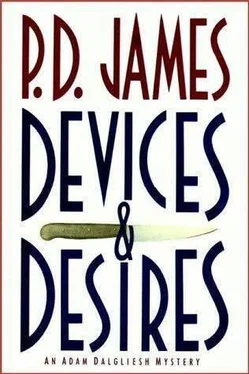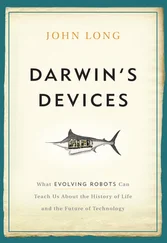He thought that he had seldom seen a more depressing place than Scudder's Cottage. A thin drizzle was falling and he saw the cottage and the neglected garden through a shimmering mist which seemed to absorb shapes and colours so that the whole scene was one damp amorphous grey. Leaving DC Gary Price in the car, Rickards and Oliphant made their way up the weed-infested path to the porch. There was no bell and when Oliphant thudded on the iron knocker the door almost immediately opened. Ryan Blaney stood before them, six foot tall, lank, bleary-eyed and gave them a long unwelcoming stare. The colour seemed to have drained even from his ruddy hair and Rickards thought he had never seen a man look so exhausted and yet still be on his feet. Blaney didn't invite them in and Rickards didn't suggest it. That intrusion had better wait until he was accompanied by a WPC. And Blaney could wait. He was anxious now to get to Larksoken Power Station. He gave the news that the portrait of Hilary Robarts had been slashed and found at Thyme Cottage, but offered no other details. There was no response. He said: 'Did you hear me, Mr Blaney?'
'Yes, I heard you. I knew that the portrait was missing.'
'When?'
'Last night, at about 9.45. Miss Mair called for it. She was going to take it to Norwich with her this morning. She'll tell you. Where is it now?'
'We have it, what remains of it. We shall need it for forensic examination. We'll give you a receipt, naturally.'
'What good will that do? You can keep it, the picture and your receipt. Slashed to pieces, did you say?'
'Not to pieces, in two clean slashes. Perhaps it can be repaired. We'll bring it with us when we come so that you can identify it.'
'I don't want to see it again. You can keep it.'
'We'll need the identification, Mr Blaney. But we'll talk about it when we see you later today. When, incidentally, did you last see the portrait?'
'Thursday evening when I wrapped it and left it in the painting shed. I haven't been in the shed since. And what's the good of talking? It was the best thing I've ever done and that bitch destroyed it. Get Alice Mair or Adam Dalgliesh to identify it. They've both seen it.'
'Are you saying you know who's responsible?' Again there was a silence. Rickards broke it by saying: 'We'll be with you late this afternoon, probably between four and five if that's convenient. And we shall have to talk to the children. We'll have a WPC with us. They're at school, I suppose, the children?'
'The twins are at playgroup, Theresa is here. She isn't well. Look, you're not going to all this trouble about a slashed portrait. Since when have the police cared about pictures?'
'We care about criminal damage. But there is something more. I have to tell you that Hilary Robarts was murdered last night.'
He stared intently at Blaney's face as he spoke. This was the moment of revelation, perhaps the moment of truth. It was surely impossible for Blaney to hear the news without betraying some emotion: shock, fear, surprise, real or simulated. Instead he said calmly: 'You don't have to tell me that either. I knew. George Jago phoned early this morning from the Local Hero.'
Did he indeed, thought Rickards, and mentally added George Jago to his list of people to be questioned as soon as possible. He asked: 'Will Theresa be in and well enough to speak to us this afternoon?'
'She'll be here and she'll be well enough.'
And then the door was closed firmly in their faces.
Oliphant said: 'God knows why Robarts wanted to buy that slum in the first place. And she's been trying to force him and the kids out for months. There's been a great deal of feeling about it in Lydsett as well as on the headland.'
'So you told me on the way here. But if Blaney killed her he'd hardly draw attention to himself by hurling that portrait through the window of Thyme Cottage. And two unrelated criminal acts, murder and malicious damage on the same night, is too great a coincidence to swallow.'
It had been a bad start to the day. The drizzle, seeping coldly under the collar of his coat, added to his mild dejection. He hadn't noticed that it was raining on the rest of the headland and could almost believe that Scudder's Lane and that picturesque but sour little hovel generated their own depressing climate. He had a lot to get through before he returned for a more rigorous confrontation with Ryan Blaney, and he wasn't looking forward to any of it. Forcing the gate shut over a clump of weeds on the path, he took a last look at the cottage. There was no smoke
from the chimney and the windows, hazed with salt, were tightly closed. It was difficult to believe that a family lived here, that the cottage hadn't long been abandoned to damp and decay. And then, at the right-hand window, he glimpsed a pale face framed with red-gold hair. Theresa Blaney was looking down at them.
Twenty minutes later the three police officers were at Larksoken Power Station. A place had been reserved for them in the car park outside the perimeter fence close to the guard house. As soon as they approached the gate it was unlocked and one of the security police came out and removed the cones. The preliminaries took only a little time. They were received with almost impassive civility by the uniformed security guard on duty, signed the book and were issued with their lapel badges. The guard telephoned the news of their arrival, reported that the Director's PA, Miss Amphlett, would be with them very shortly and then appeared to lose interest in them. His companion, who had opened the gates and removed the cones, stood casually chatting to a stocky man dressed as a diver and carrying his helmet under his arm, who had apparently been working on one of the water towers. Neither of them seemed particularly interested in the arrival of the police. If Dr Mair had instructed that they were to be received with courtesy but the minimum of fuss, his staff couldn't have done it better.
Through the window of the guard house they saw a woman, obviously Miss Amphlett, walking unhurriedly down the concrete path. She was a cool, self-possessed blonde who, on arrival, ignored Oliphant's bold stare as if he weren't present and gravely greeted Rickards. But she didn't respond to his smile, either because she thought a smile inappropriate to the occasion or, more likely, because in her view few visitors to Larksoken merited such a personal welcome and a police officer wasn't among them.
She said: 'Dr Mair is ready for you, Chief Inspector,' and turned to lead the way. It made him feel like a patient being shown into the presence of a consultant. You could tell a lot about a man from his PA and what she told him about Dr Alex Mair reinforced his private imaginings. He thought of his own secretary, tousled-haired, nineteen-year-old Kim, who dressed in the more bizarre extreme of contemporary youth fashion, whose shorthand was as unreliable as her timekeeping, but who never greeted even the lowliest visitor without a wide smile and the offer, which they were ill advised to accept, of office coffee and biscuits.
They followed Miss Amphlett between the wide lawns to the administration building. She was a woman who induced unease and Oliphant, obviously feeling the need to assert himself, began to prattle.
'That's the turbine house to our right, sir, and the reactor building and the cooling plant behind it. The workshop is to the left. It's a Magnox thermal reactor, sir, a type first commissioned in 1956. We had it all explained to us when we went round. The fuel is uranium metal. To conserve the neutrons and to allow natural uranium to be used the fuel is clad in a magnesium alloy called Magnox with a low neutron absorption. That's where the reactor gets its name. They extract the heat by passing carbon dioxide gas over the fuel in the reactor core. That transfers its heat to water in a steam generator and the steam drives a turbine coupled to an electric generator.'
Читать дальше












